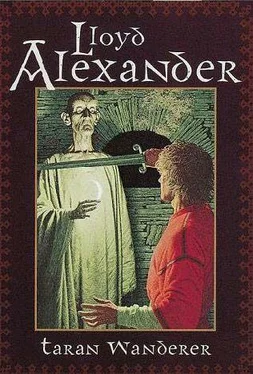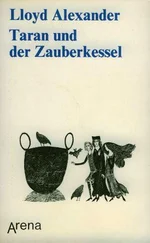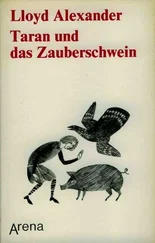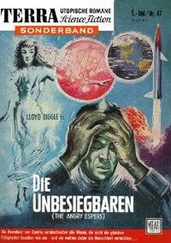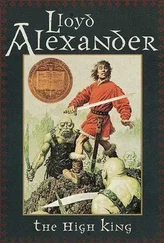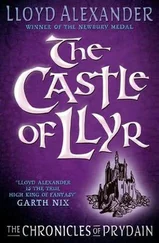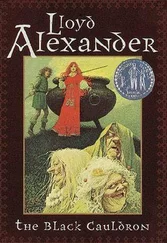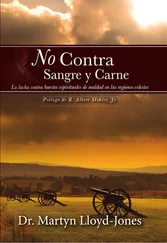The Free Commots
FROM SMALL AVREN THEY WENDED eastward at an easy pace, halting as it pleased them, sleeping on the turf or sheltering at one of the many farmsteads among the rich green vales. This was the land of the Free Commots, of cottages clustering in loose circles, rimmed by cultivated fields and pastures. Taran found the Commot folk courteous and hospitable. Though he named himself only as Taran Wanderer, the dwellers in these hamlets and villages respected his privacy and asked nothing of his birthplace, rank, or destination.
Taran and Gurgi had ridden into the outskirts of Commot Cenarth when Taran reined up Melynlas at a long, low-roofed shed from which rang the sound of hammer on anvil. Within, he found the smith, a barrel-chested, leather-aproned man with a stubbly black beard and a great shock of black hair bristly as a brush. His eyelashes were scorched, grime and soot smudged his face; sparks rained on his bare shoulders but he seemed to count them no more than fireflies. In a voice like stones rattling on a bronze shield he roared out a song in time with his hammer strokes so loudly that Taran judged the man's lungs as leathery as his bellows. While Gurgi cautiously drew back from the shower of sparks, Taran called a greeting, scarcely able to make himself heard above the din.
"Master Smith," he said, bowing deeply as the man at last caught sight of him and put down the hammer, "I am called Taran Wanderer and journey seeking a craft to help me earn my bread. I know a little of your art and ask you to teach me more. I have no gold or silver to pay you, but name any task and I will do it gladly."
"Away with you!" shouted the smith. "Tasks I have aplenty, but no time for teaching others to do them."
"Is time what lacks?" Taran said, glancing shrewdly at the smith. "I've heard it said that a man must be a true master of his craft if he would teach it.
"Hold!" roared the smith as Taran was about to turn away, and he snatched up the hammer as if he meant to throw it at Taran's head. "You doubt my skill? I've flattened men on my anvil for less! Skill? In all the Free Comrnots none has greater than Hevydd Son of Hirwas!"
With that he seized the tongs, drew a bar of red-hot iron from the roaring furnace, flung it on the anvil, and set to hammering with such quick strokes that Taran could hardly follow the movement of Hevydd's muscular arm; and suddenly there formed at the end of the bar a hawthorn blossom perfect in every turn of leaf and petal.
Taran looked at it in astonishment and admiration. "Never have I seen work so deftly done."
"Nor will you see it elsewhere," Hevydd answered, at pains to hide a proud grin. "But what tale do you tell me? You know the shaping of metal? The secrets are not given to many. Even I have not gained them all." Angrily he shook his bristly head. "The deepest? They lie hidden in Annuvin, stolen by Arawn Death-Lord. Lost they are. Lost forever to Prydain.
"But here, take these," ordered the smith, pressing the tongs and hammer into Taran's hands. "Beat the bar smooth as it was, and quickly, before it cools. Show me what strength you have in those chicken wings of yours."
Taran strode to the anvil and; as Coll had taught him long ago, did his best to straighten the rapidly cooling iron. The smith, folding his huge arms, eyed him critically for a time, then burst into loud laughter.
"Enough, enough!" cried Hevydd. "You speak truth. Of the art, indeed, you know little. And yet," he added, rubbing his chin with a battered thumb nearly as thick as a fist, "and yet, you have the sense of it." He looked closely at Taran. "But have you courage to stand up to fire? To fight hot iron with only hammer and tongs?"
"Teach me the craft," Taran replied. "You'll have no need to teach me courage."
"Boldly said!" cried Hevydd, clapping Taran on the shoulder. "I'll temper you well in my forge! Prove yourself to me and I'll vow to make a smith of you. Now, to begin…" His eye fell on Taran's empty scabbard. "Once, it would seem, you bore a blade."
"Once I did," Taran answered. "But it is long gone, and now I journey weaponless."
"Then you shall make a sword," commanded Hevydd. "And when you've done, you'll― tell me which is harder labor: smiting or smithing!"
To this Taran learned the answer soon enough. The next several days were the most toilsome he had ever spent. He thought, at first, the smith would set him to work shaping one of the many bars already in the forge. But Hevydd had no such intention.
"What, start when half the work is done?" Hevydd snorted. "No, no, my lad. You'll forge a sword from beginning to end."
Thus, the first task Hevydd gave Taran was gathering fuel for the furnace, and from dawn to dusk Taran stoked the fire until he saw the forge as a roaring, flame-tongued monster that could never eat its fill. Even then the work had only begun, for Hevydd soon put him to shoveling in a very mountain of stones, then smelting out the metal they bore. By the time the bar itself was cast, Taran's face and arms were scorched and blackened, and his hands were covered with more blisters than skin. His back ached; his ears rang with all the clank and clatter and with Hevydd's voice shouting orders and instructions. Gurgi, who had offered to pump the bellows, never faltered even when a cloud of sparks burst and flew into his shaggy hair, singeing it away in patches until he looked as if a flock of birds had plucked him to make their nests.
"Life's a forge!" cried the smith, as Taran, his brow streaming, beat at the strip of metal. "Yes, and hammer and anvil, too! You'll be roasted, smelted, and pounded, and you'll scarce know what's happening to you. But stand boldly to it! Metal's worthless till it's shaped and tempered!"
Despite the weariness that made him drop gratefully at day's end to the straw pallet in the shed, Taran's heart quickened and his spirits rose as the blade little by little took shape on the anvil. The heavy hammer seemed to weigh more each time he lifted it; but at last, with a joyous cry, he flung it down and raised the finished sword, well-wrought and balanced, gleaming brightly in the light of the forge.
"A handsome weapon, master smith!" he cried. "As fair as the one I bore!"
"What, then?" Hevydd exclaimed. "Have you done your work so well? Would you trust your life to a blade untried?" He flung out a burly arm toward a wooden block in a corner of the forge. "Strike hard," he commanded. "The flat, the edge, and the point."
Proudly Taran raised the sword high and swung it down to the block. The weapon shuddered with the force of the blow, a sharp crack and clang smote his ears as the blade shattered and the shards went flying in all directions.
Taran shouted in dismay and could have wept as he stared, disbelieving, at the broken hilt still clutched in his hand. He turned and gave Hevydd a despairing glance.
"So ho!" cried the smith, not at all distressed by Taran's wretched and rueful expression. "Did you think to gain a worthy blade at first go?" He laughed loudly and shook his head.
"Then what must I do?" Taran cried, appalled at Hevydd's words.
"Do?" the smith retorted. "What else but start anew?"
And so they did, but this time for Taran there remained little of his joyous hopes. He labored grimly and doggedly, all the more dejected when Hevydd ordered him to cast aside two new blades even before they were tempered, judging them already flawed. The reek of hot metal clung in his nostrils and flavored even the food he hastily swallowed; the billows of steam from the great quenching tub choked him as if he were breathing clouds of scalding fog; the ceaseless din almost addled his wits until indeed he felt it was himself, not the blade, being hammered.
The next blade he shaped seemed to him ugly, dinted, and scarred, without the fair proportions of the first, and this too he would have cast aside had not the smith ordered him to finish it.
Читать дальше
